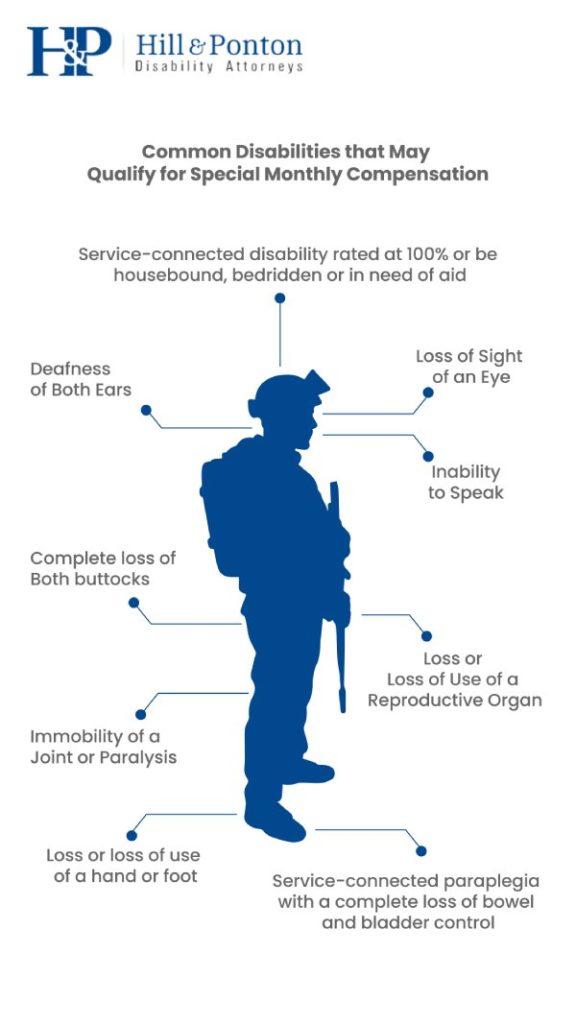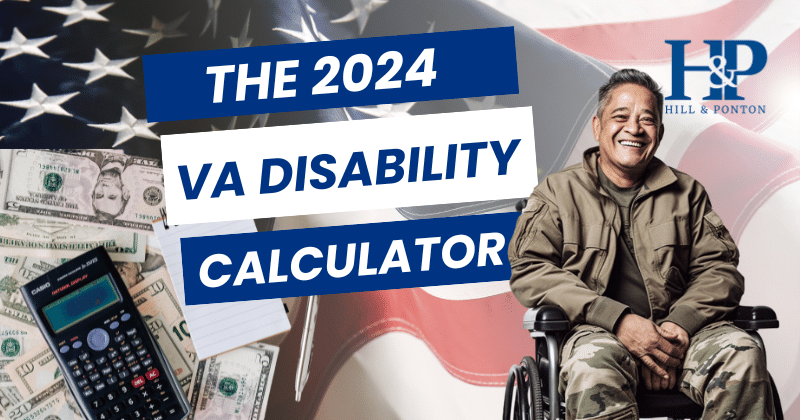For some veterans who sustained significant disabilities during their military service, regular VA disability compensation isn’t enough.
Another sometimes overlooked benefit offered by the Veterans Administration is a program called Special Monthly Compensation (SMC), which was created with these veterans in mind.
SMC provides added financial assistance to those who have service-related disabilities that are above and beyond average cases.
Its primary purpose is to compensate for extra care and assistance that might be necessary.
Unlike regular VA disability compensation, which is based on severity of individual disabilities, SMC takes into account the person as a whole and all the disabilities they have.
There are a variety of different types of SMC (SMC-K thru SMC-T), that focus on specific types of disabilities.
In this article, we’ll walk you through everything you need to know about SMC, including:
- What are the different types of SMC and what disabilities qualify?
- What does SMC pay?
- How do I apply for SMC?
- Frequently Asked Questions about SMC
What are the different types of SMC and what disabilities qualify?
There are multiple types of special monthly compensation, each designed to help veterans with specific disabilities.
In the following section, we’ll talk about each of these types, like SMC-K and SMC-L, and explain what would qualify you for each type.
Whether you may need more help at home, have lost the use of a limb or face other significant challenges that impact your daily life, understanding what is available to you can help you get the support you need.

SMC-K (Special K)
SMC-K, also known as “Special K” is one of the types of special monthly compensation available through the VA.
It is designed for veterans who have lost, or lost the use of, specific body parts or body functions, due to a service-connected condition.
Here’s some basic facts about SMC-K:
- Purpose: to compensate for the loss or loss of the use of certain body parts or functions.
- Eligibility: Veterans with service-connected disabilities such as the loss of a hand or a foot, loss of sight or hearing, loss of a reproductive organ or 25% or more of tissue from a single breast or both in combination, or are unable to speak.
- Multiple Qualifications: If you happen to have more than one qualifying disability, you may receive additional SMC-K benefits.
For more information about SMC-K and how to apply, click here.
SMC-S (Housebound Benefits)
SMC-S is designed for veterans who are, in most cases, confined to their home due to service-connected disabilities.
Veterans who are 100% or TDIU for one single condition and rated 60% for their other combined conditions are also eligible for SMC-S based on the severity of their conditions without being housebound.
Check out our VA disability calculator to learn more about what multiple conditions could get you rated for below.
Try our VA Disability Calculator now by clicking here!
This benefit is to help assist with the limitations that often occur due to the inability to leave their residence.
Details about SMC-S include:
- Purpose: providing additional support for veterans who are mostly confined to their homes because of their service-connected disabilities.
- Eligibility: veterans with one service-connected disability rated 100% disabling and another, separate condition (or multiple) that is rated at least 60% disabling, or those who are permanently housebound.
SMC-L to O
Special Monthly Compensation (SMC) categories L to O are designated for veterans with severe service-connected disabilities.
They are meant for individuals who require a greater amount of assistance with daily living due to the presence of more significant health conditions.
Want to learn some ways to get SMC-O? We offer some quick tips in our short video below!
Here’s a brief description of each category:
- SMC-L: When veterans have limb loss or loss of use, like losing both feet for example, or a combination of severe disabilities, like blindness or becoming bedridden and requiring Aid and Attendance (A&A).
- SMC-M: Veterans who have extreme disabilities like the loss of both hands, or other severe disability combinations that impact mobility or daily life.
- SMC-N: When a veteran has severe conditions like loss of both arms near the shoulder, or similar type conditions/combination of conditions.
- SMC-O: The highest level, typically for veterans with full paralysis or conditions that require significant amounts of care.
SMC-R1 and SMC-R2 (Aid and Attendance)
SMC-R1 and SMC-R2, also known as Aid and Attendance, is another category in the VA’s special monthly compensation program.
It is designed for veterans who require regular special assistance because of their service-connected disabilities.
Here’s the basic facts about SMC-R:
- Purpose: to provide additional compensation for veterans who need assistance with daily activities like bathing, dressing, eating or equipment use.
- Eligibility: Veterans who are service-connected with a severe disability and require day-to-day personal assistance. R2 requires the eligibility of R1 and the need for a higher level of care by or under the supervision of a licensed healthcare professional, such as a physical therapist, LPN, CNA, MD, etc.
To learn more about Aid & Attendance, click here to read our article.
SMC-T (Traumatic Brain Injury)
SMC-T is a category of the Special Monthly Compensation (SMC) program that is meant for veterans who have been diagnosed with a Traumatic Brain Injury (TBI) with severe consequences or residual impacts.
For veterans with major TBIs and residuals, sometimes additional care is needed and SMC-T is useful for providing extra financial support for these needs.
Here’s some essential information about SMC-T:
- Purpose: For veterans who experienced a TBI and require an exceptional level of care, often to avoid being permanently hospitalized.
- Eligibility: Veterans whose TBI’s and residuals require regular, extensive and specialized care, going beyond those required for Aid and Attendance.
To learn more about SMC-T and the benefits you could expect, click here.
How much does SMC pay and how can I get it?
If you’re a veteran with a 100% disability rating and face severe or unique challenges due to your service-connected conditions, you might be eligible for Special Monthly Compensation (SMC) benefits.
SMC is designed for veterans who need extra financial support above and beyond regular VA disability compensation.
How much can you receive (updated 2024)?
The amount you receive from SMC can vary significantly depending on the type and severity of your disability. 2024 payment rates range from $132.74 per month for SMC-K, to as high as $10,697.23 per month for SMC-R/2 and SMC-T. For exact numbers of what you could receive, visit the VA’s 2024 Special Monthly Compensation Rates page.
How do I apply for SMC?
To qualify for Special Monthly Compensation (SMC) benefits, your disabilities must meet set criteria established by the Veterans Administration (VA).
For example, if you have a severe limb loss, SMC-L may be of benefit, or if you are housebound, it may be useful for you to receive SMC-S benefits.
It’s important to note that the VA should automatically consider you for SMC if your medical records and evidence in your claim indicate you are potentially eligible.
If you believe you are eligible and did not receive benefits, be proactive and take action to ensure you get the help you deserve.
Frequently Asked Questions (FAQ) about SMC
Content Review
Cassandra Crosby, an Accredited Agent and claims advocate for Matthew Hill & Shelly Mark’s teams, reviewed the information provided in this post.










